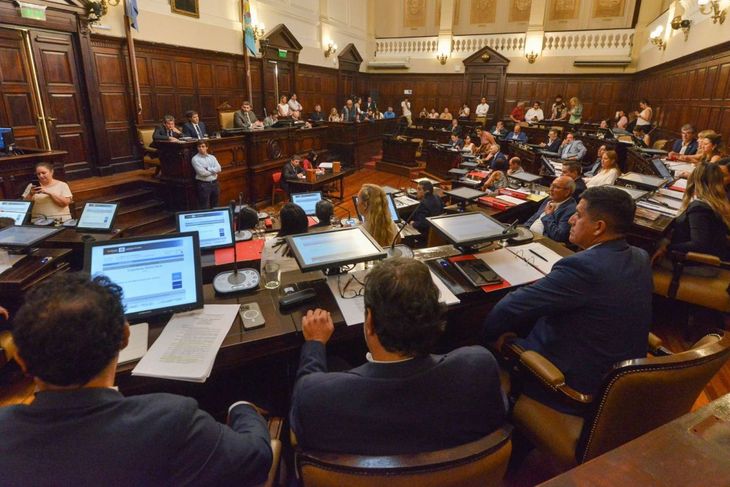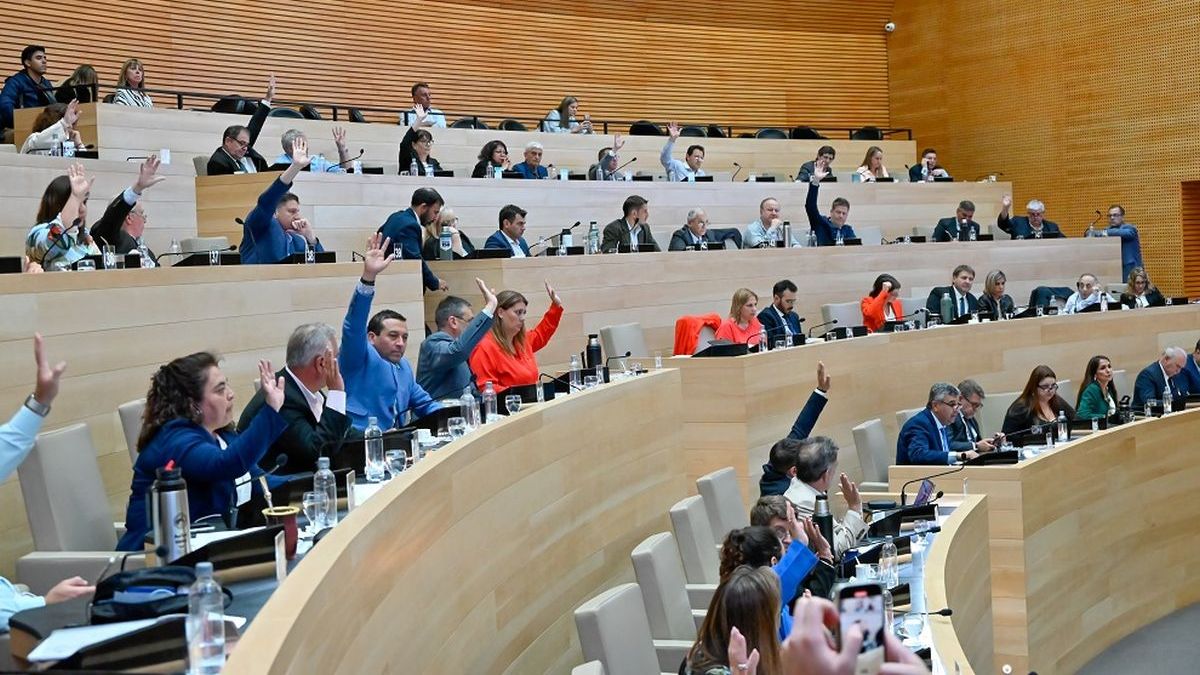Although the general spirit of the texts is shared, each district has its own particularities. So, for example, Mendoza is now putting forward a proposal to prevent people with criminal records for serious crimes from holding educational positions. Black River and CordovaMeanwhile, they are preparing to debate the issue for public positions, a fact that was already rejected by the Buenos Aires Legislature this week.
Clean Record: rejection in CABA and open debates
Currently, several districts have a Clean Record: Santa Fe, Jujuy, San Juan, Salta, Chubut and Mendoza. On the contrary, the City of Buenos Aires tried to approve its own project, but it was rejected this Thursday by the Legislature during a marathon session, in which the Budget 2025.
Although the text obtained 39 affirmative votes and 21 negative votes, it did not obtain the necessary 40 green lights, given that, being an electoral initiative, it required that special majority. The initiative had the support of the PRO, the Civic Coalition, the libertarians and the allied monoblocs. However, Unión por la Patria (UP) and the Left Front (FIT) opposed it.
Embed – https://publish.twitter.com/oembed?url=https://x.com/jorgemacri/status/1867343445875896580&partner=&hide_thread=false
The Clean Record Law failed in the @LegisCABA because the Kirchnerist legislators chose to protect the corrupt instead of listening to the people of Buenos Aires. Politics must end impunity and stop being complicit. Enough of privileges. pic.twitter.com/PnJpGSIczE
— Jorge Macri (@jorgemacri) December 12, 2024
After the vote, the head of Government, Jorge Macrifired against Peronism and the FIT. “The Clean Record Law failed in the Legislature because the Kirchnerist legislators chose to protect the corrupt instead of listening to the people of Buenos Aires. Politics must end impunity and stop being complicit. Enough of privileges”the official protested.
On the contrary, the UP legislator Graciana Penafort had argued: “How afraid they are of democracy. If the people want to vote for someone who is not convicted, who am I to say no? “Do not be afraid of democracy or the Constitution.”
Black River and CordovaMeanwhile, they already have dance projects. In the Patagonian province, Governor Alberto Weretilneck sent the initiative to the Legislature and included it in the agenda of extraordinary sessions. It will be discussed next Tuesday, December 18.
In Black Riverthe governor Alberto Weretilneck sent a Clean File project to the Legislature and included it in the agenda of extraordinary sessions. He will be treated by the body next Tuesday, December 18. Weretilneck stated that the initiative seeks to “Those who have final convictions for intentional crimes cannot be candidates for public office or hold party positions while their sentence lasts.” “It is a measure that goes beyond the symbolic: it guarantees transparency, ethics and a real commitment to society,” he pointed out. .
The Peronist opposition has already anticipated its rejection and argued that it is an attempt to “indoctrinate” the leadership. Even from the Justicialist Party (PJ) referred to the Techo Digno case, which has 17 former mayors accused of alleged corruption crimes, and classified it as a “rionegrin-style lawafare.” They also made reference to “grotesque and arbitrary judicial cases.”
Lopez Austin.jpg
The Minister of Justice and Labor of Córdoba, Julian Lopezreceived legislators Brenda Austin and Julieta Rinaldi to unify positions to approve a Clean Record project.
For his part, the Cordoban Martin Llaryora seeks to join forces with the opposition to sanction a consensual Clean Record project. At the beginning of the month, the provincial Minister of Justice and Labor, Julian Lopezmet with provincial legislators who presented law proposals on the subject.
They participated in the meeting with López Brenda Austinof the Radical Civic Union, and Julieta Rinaldi and Ileana Quaglinoof We make United for Córdoba. Via Zoom, they were present Maria del Rosario Acevedo and Victoria Busso. The Llaryora administration stressed that their decision is to enact the law in the current legislative period.
Clean educational record: unprecedented project in Mendoza
Mendoza It is a particular case. Although the province has had a Clean Record since 2020, the management of Alfredo Cornejo is now promoting an initiative to extend the law to the educational field. Its objective is to “strengthen the protection of girls, boys and adolescents in school institutions by prohibiting the entry or stay of people with criminal records related to serious crimes.”
The project was voted unanimously in the local Senate and must be discussed by the Chamber of Deputies. Specifically, prohibits people with criminal records for serious crimes, such as those committed against sexual integrity, freedom, identity or embezzlement of public funds, from holding positions as teachers, guards or administrative staff.
Mendoza Senate.jpg

Unanimously, the Senate of Mendoza approved an educational Clean Record project.
In addition, it seeks to guarantee that educational institutions are safe and reliable spaces by creating a registry of disqualifications that will be under the management of the General Directorate of Schools. This registry will make it possible to reinforce transparency in the selection processes and strengthen the commitment of the educational system to the safety of students.
The proposal, at the same time, includes specific measures for privately managed schools, forcing them to adhere to these regulations, and establishes more severe sanctions for those who commit this type of crimes, such as permanent disqualification. These provisions seek to standardize protection standards throughout the educational system of Mendoza.
In parallel, Chubuta pioneer province in applying the regulations for public positions, In recent months, it has tightened the Clean Record regime and prevented people with a sentence for an intentional criminal offense of any type, not just corruption, from being candidates for elective or party positions.
Embed – https://publish.twitter.com/oembed?url=https://x.com/NachoTorresCH/status/1795905926655881597&partner=&hide_thread=false
IN CHUBUT THERE IS NO MORE PLACE FOR THE LIVING AND THE CORRUPT
We presented in the Legislature the Asset Forfeiture Law, a fundamental tool to recover what was stolen from us Chubut people and promote transparency.
We also present a Public Ethics law that… pic.twitter.com/Ube5FKDEMN
— Nacho Torres (@NachoTorresCH) May 29, 2024
During October, the Chubut Legislature approved with 23 of the 24 votes present and only one abstention the bill presented by deputy Juan Pais that modifies the Law of Ethics and Transparency of the Public Service and incorporates the Clean Record for non-public positions. electives.
Another of the first districts to take the initiative was Santa Fe, which incorporated its own law in 2022. Now, after the need to reform the local Constitution was approved, the ruling party will seek to include the Clean File in the text of the new Magna Carta.
Furthermore, in Tierra del Fuego, Antarctica and the South Atlantic Islands, legislator Jorge Lechman, from the Somos Fueguinos Movement, presented his own project in this regard. At the same time, in Neuquén, national deputy Pablo Cervi, from the UCR, demanded that a project along these lines be promoted in his province.
Source: Ambito
I am a 24-year-old writer and journalist who has been working in the news industry for the past two years. I write primarily about market news, so if you’re looking for insights into what’s going on in the stock market or economic indicators, you’ve come to the right place. I also dabble in writing articles on lifestyle trends and pop culture news.




